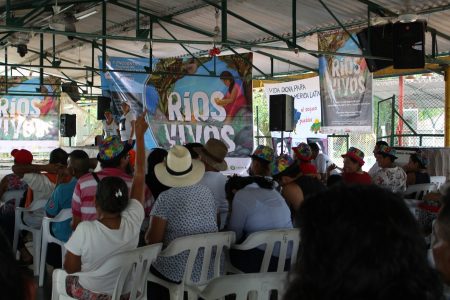The meeting is taking place in Barrancabermeja, a city located in Santander Department. During its first day, 400 people arrived, among them members of the six national delegations of Ríos Vivos and international representatives. The national delegations are: Asprocig (of Bajo Sinú region), Asoquimbo (Huila), Social Movement for the Defense of Sogamoso and Chucurí Rivers (Santander), Ríos Vivos Movement Cauca, Consejo Mayor del Río Anchincayá (Valle del Cauca) and Ríos Vivos Movement Antioquia.
Ríos Vivos is part of the Movement of People Affected by Dams (MAR) of Latin America, so there are international representatives from Argentina, Chile, Paraguay, Brazil, Bolivia, Panama, Peru, Cuba, Mexico, Honduras and Guatemala.
Naudel González, member of Asprocig stated in an interview with Real World Radio that the delegations will discuss “elements to strengthen the movement” and said that this process began 18 years ago.
Meanwhile, coordinator Juan Pablo Soler highlighted that the event will focus on two main themes: energy transition (which is being looted by corporations) and environment for peace (with clear and inspiring examples such as the projects carried out by the group affected by Hidrosogamoso).
This second national meeting is taking place six years after the first one, which was held in Girardota. Soler made reference to the agreements reached back then, and how since 2013, when the government said “We don´t know who you are”, they have become a reference for the region in terms of the defense of natural resources, territories and human rights of the people affected by dams and other extractivist projects.
In that first meeting, they also agreed to recognize themselves as victims of the armed conflict and to link megaprojects with the war, stating that “before dams were built, massacres took place: 73 in Antioquia, 21 in Sogamoso, 100 in Bajo Sinú”, said the Ríos Vivos coordinator.
“Today Ríos Vivos is an alternative for energy transition based on energy and water sovereignty”, he said, and stated that “we are more alive than ever”, not only through delegations, but also through spaces such as the Agrarian Summit or the Patriotic March.
“We want to continue enjoying and staying in the territory. If we wanted to migrate, we would have done so already”, he said. The event will continue today, Tuesday 9 with plenary sessions, discussions and a food market, as well as with a capacity building school for children who join their mothers and fathers in their struggles.
